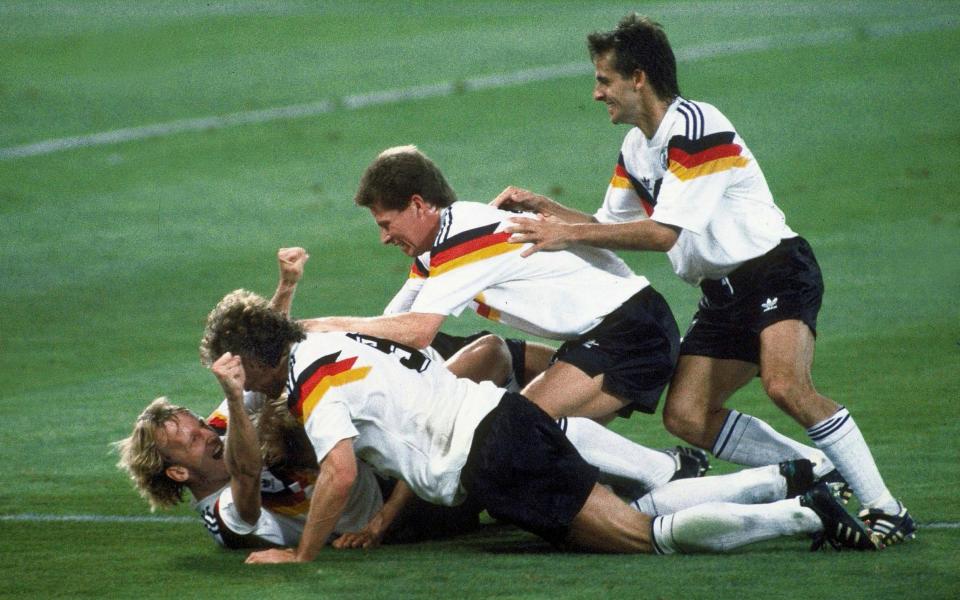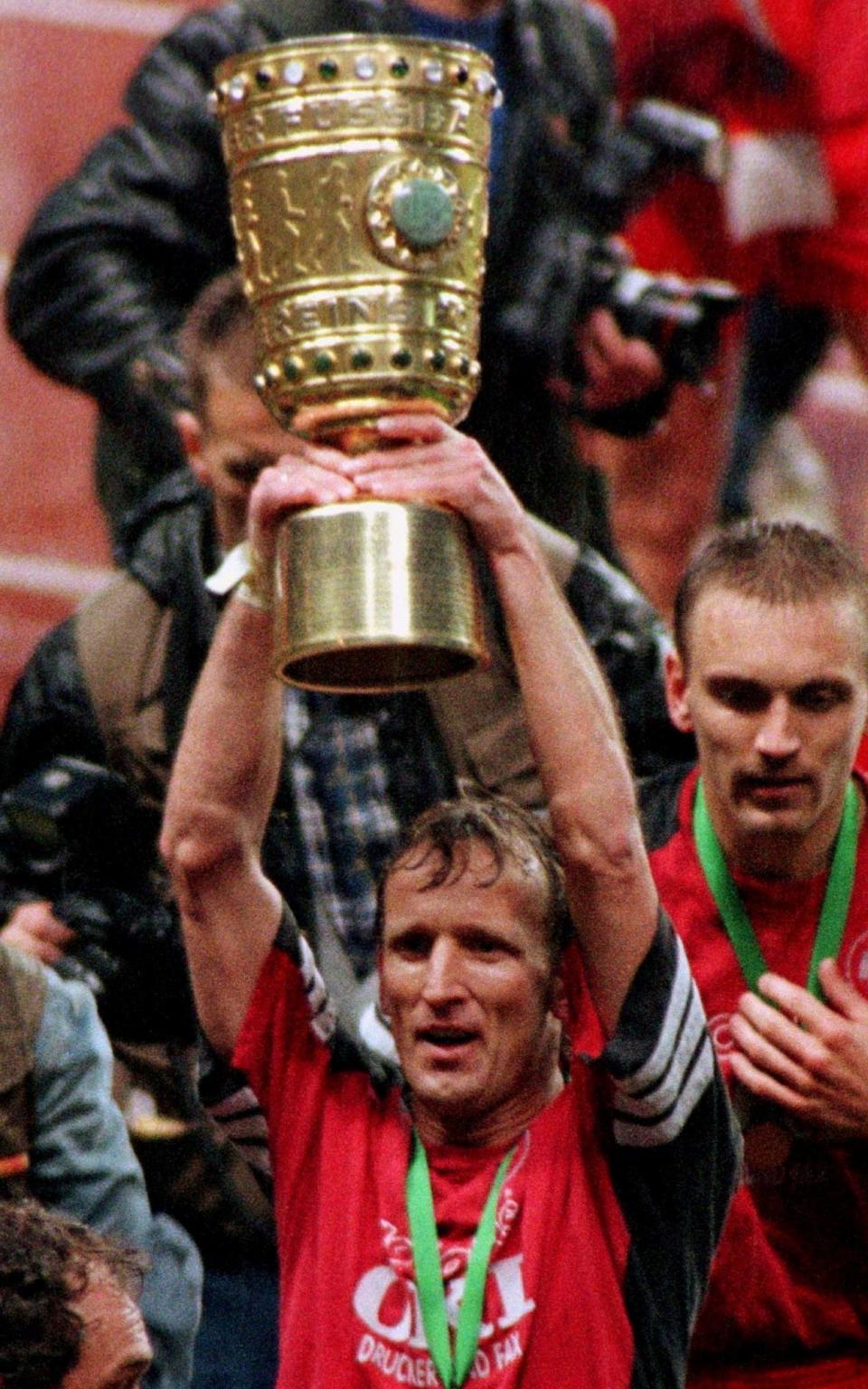Andreas Brehme, peerless wing-back whose penalty won the World Cup for West Germany – obituary

- Oops!Something went wrong.Please try again later.
- Oops!Something went wrong.Please try again later.
- Oops!Something went wrong.Please try again later.
- Oops!Something went wrong.Please try again later.
- Oops!Something went wrong.Please try again later.
- Oops!Something went wrong.Please try again later.
Andreas Brehme, who has died of a heart attack aged 63, was one of the finest wing-backs of his generation, solid in defence and consistently threatening in attack; his greatest moment came when he scored the late penalty that won the 1990 World Cup for West Germany against Diego Maradona’s Argentina, and his international captain Lothar Matthäus said he was the most talented footballer he ever played with.
Brehme, playing on the left, was one of the best dead-ball specialists the game has known, and an unfailingly accurate crosser of the ball. He was something of a rarity in being completely two-footed – “My left is harder and my right is more precise” – and Franz Beckenbauer, who coached him for club and country, once said, “I have known Andi for 20 years and I still don’t know if he is right- or left-footed”
He generally used his right foot for penalties, and in the 1990 World Cup semi-final shoot-out he helped break English hearts when he stepped up to take Germany’s first, slotting the ball neatly into the bottom corner past Peter Shilton; half an hour or so earlier his thunderous left-footed free-kick had bounced off the on-rushing Paul Parker and looped over Shilton to open the scoring.
The final was a dour affair, more so when Argentina had a man sent off and, in football parlance, “parked the bus”. Then with five minutes to go Rudi Völler, one of football’s most adroit divers, went down in the penalty area under minimal contact from Roberto Sensini.

Völler was the designated penalty-taker but declined, bowing to the German superstition that the player fouled (or in this case, “fouled”) should not take the kick. As captain, Lothar Matthäus was next in line but he had changed his boots at half-time and did not feel comfortable stepping up.
“I didn’t mind who took it, so I offered,” Brehme recalled. “It might surprise people, but I wasn’t nervous at all as I ran up. The worst thing was having to wait five minutes while the Argentinians kicked the ball away and argued with the referee. I just wanted to find some peace away from all the chaos. I was thinking of nothing.”
Völler told him: “If you score, we’ll be world champions.” Brehme calmly rolled the ball past Sergio Goycochea – in exactly the same spot as his kick against Shilton – and so they were, extracting revenge for the final four years earlier in Mexico when even the redoubtable Germans had been unable to handle Diego Maradona.
Andi Brehme, as he was generally to be known, was born in Hamburg on November 9 1960, the son of Bernd, a footballer, and played his early football for his father’s lower-league side HSV Barmbek-Uhlenhorst. Then after a year with Saarbrücken he joined Kaiserslautern of the Bundesliga, West Germany’s top division, in 1981.
In his first season they reached the semi-finals of the Uefa Cup, losing narrowly to the eventual winners, Göteborg. He won the first of his 86 caps for Germany in 1984 – and was named in the team of the tournament at that year’s European Championship despite Germany’s failure to progress beyond the group stage.
Then in 1986, as West Germany reached the World Cup final, he joined Bayern Munich for 2 million deutschmarks, the second-highest transfer fee in the Bundesliga at that point. Bayern won the title in 1987, then in 1988 Brehme and his teammate Matthäus signed for Inter Milan, winning the title in their first season (with Brehme voted Italy’s footballer of the year ahead of Napoli’s Maradona).

They were joined the following summer by their former Bayern teammate Jürgen Klinsmann. Inter, under their manager Giovanni Trapattoni, were in a rich vein of form in what was then the strongest league in the world, and just as their city rivals AC Milan flourished with their Dutch trio of Marco van Basten, Frank Rijkaard and Ruud Gullit, Inter’s German triumvirate was key to their success – even if Brehme frequently found himself acting as mediator between two players who did not get on off the pitch.
In 1991 Inter won the Uefa Cup, beating Roma 2-1 on aggregate in the final, then in 1992 Brehme spent a season at Real Zaragoza in Spain before returning to Kaiserslautern.
In 1996 they won the German Cup but were relegated. They bounced straight back up, and in 1998 sensationally won the Bundesliga; but by then Brehme was coming to the end of his career, spending much of the season coming off the bench, and he retired at the end of the season.
He managed Kaiserslautern from 2000-02, but was sacked with the club facing relegation. There were also brief and unsuccessful stints at the Bundesliga 2 side SpVgg Unterhaching, and as assistant to Trapattoni at VfB Stuttgart, and he later became an ambassador for the German FA.
Andi Brehme is survived by his partner Susanne Schaefer and by his two sons from his marriage to Pilar Martinez, which ended in divorce.
Andreas Brehme, born November 9 1960, died February 20 2024

